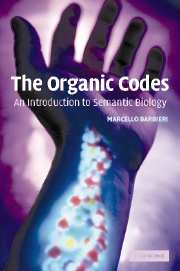Book contents
- Frontmatter
- Contents
- Foreword
- Dedication
- Acknowledgements
- Introduction
- Chapter 1 The microscope and the cell
- Chapter 2 Theories of evolution
- Chapter 3 A new model for biology
- Chapter 4 Organic codes and organic memories
- Chapter 5 The origin of life
- Chapter 6 Prokaryotes and eukaryotes
- Chapter 7 The Cambrian explosion
- Chapter 8 Semantic biology
- Chapter 9 A brief summary
- Appendix: Definitions of life
- Afterword
- References
- Index
Chapter 2 - Theories of evolution
Published online by Cambridge University Press: 23 November 2009
- Frontmatter
- Contents
- Foreword
- Dedication
- Acknowledgements
- Introduction
- Chapter 1 The microscope and the cell
- Chapter 2 Theories of evolution
- Chapter 3 A new model for biology
- Chapter 4 Organic codes and organic memories
- Chapter 5 The origin of life
- Chapter 6 Prokaryotes and eukaryotes
- Chapter 7 The Cambrian explosion
- Chapter 8 Semantic biology
- Chapter 9 A brief summary
- Appendix: Definitions of life
- Afterword
- References
- Index
Summary
Our view of evolution has gone through various building stages in the last two centuries, and this chapter presents a bird's-eye view of those steps. It starts by emphasising that for the two founding fathers – Lamarck and Darwin – evolution was necessary not to explain the past but to understand the present. More precisely, it was the only way to account for the experimental fact that organisms are admirably adapted to their niches and lifestyles. In the end, it was Darwin's idea of natural selection that solved the problem, and today this is virtually a closed chapter: adaptation is always the result of natural selection. Adaptation, however, is not everything in life, and the existence of other mechanisms has been repeatedly debated. The best example is genetic drift, whose reality is now beyond doubt and which clearly is a second mechanism of evolution at the molecular level, even if the relative contribution of natural selection and neutral drift at this level remains an open problem. A third mechanism of molecular evolution has been inspired by Barbara McClintock's work and can be referred to as evolution by genomic flux, or, in Gabriel Dover's terminology, by molecular drive, but in this case the consensus is not yet widespread. Another topical issue in evolutionary biology has been the unification of all life sciences under the principle of natural selection, a project that up until recently was called the Modern Synthesis, or panselectionism, while today it is generally referred to as universal Darwinism.
- Type
- Chapter
- Information
- The Organic CodesAn Introduction to Semantic Biology, pp. 33 - 66Publisher: Cambridge University PressPrint publication year: 2002



